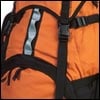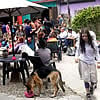When a group of backpackers was found Tuesday morning by search-and-rescue helicopters in a remote region of Nepal, the first public word for many desperately anxious relatives and friends appeared not in the news media, but on Chabad of Nepal’s Facebook page: “Fifty Israelis were rescued from the Langtag National Park, and they are on their way the Chabad House! We’ll post a list of names soon!” read the Facebook post in Hebrew.
The posting came soon after there were cheers of relief at the Chabad center by the more than 100 backpackers and hikers who have taken refuge there. While those discovered today have yet to be airlifted to safety, thousands of people, including 11 Israelis, remain unaccounted for. The Chabad center posted their hopes and prayers to welcome them all.
In the hours—and now days—since a 7.8 magnitude earthquake shattered the Nepal capital of Kathmandu and surrounding regions, social media has become a vital link for families searching for their loved ones and for those desperate for any news coming out of the region.
A prime example is the Facebook page of Chezky and Chani Lifshitz, co-directors of Chabad of Nepal, which is usually filled with family photos, visitors’ pictures, announcements about upcoming events, holiday notifications and other local tidings.
Although they remain without phone service, public electricity or running water, with sparse power only from a small generator, the emissaries are able to occasionally get an Internet connection where they briefly post information and photos that serve as a lifeline for those outside the impoverished South Asian nation seeking information and assistance.
The situation has also shed light on the commitment of Chabad-Lubavitch emissaries, who work with and care for not only other Jews, but humankind as a whole.

The center has been posting updated photographs of their handwritten list of those who have taken refuge there, including newly found arrivals, as well as brief updates of the general situation and that at the center.
“It is 6:15 p.m.,” Chani Lifshitz wrote Monday evening on Facebook. “Hot dinner is being served right now to anyone who needs it here at Chabad in Kathmandu. From moment to moment, we are learning that establishing proper communication and discovering the scope of the tragedy that happened here will take longer than we had thought. Meantime, we are trying to give strength to worried friends and families. We promise that we will not stop for even a moment from working all avenues.”
To date, more than 4,000 people have been killed as a result of the massive earthquake that struck Saturday, opening huge gaps in roads and toppling buildings throughout the region, including some ancient structures. Nepalese military are working to help with the massive search efforts underway to find people trapped in the rubble.
Aftershocks have slowed and decreased in intensity, yet thousands are now homeless and living in makeshift tents or sleeping right on the rubble. The number of dead is expected to rise as search-and-rescue teams, including several groups from Israel, arrive in Nepal and weed their way through the wreckage.

Aid is flowing into the country, but water and food are being utilized almost as soon as it arrives. Search-and-rescue efforts are continuing at a frantic pace, as experts say the best chances of finding people alive after an earthquake is within the first 72 hours.
Mitzvah Campaign at Work
While those seeing the images and destruction coming from that part of the world may feel unable to help, there are indeed things they can do from home, stresses Rabbi Sruly Simon, co-director of Chabad Student Centre of Kingston, in Ontario, Canada, with his wife, Esther.
It was a mission they took personally after learning that a young man who had been involved with their Chabad House—22-year-old Casey Blustein—was missing in the quake’s aftermath.

Recalling the words of the Rebbe—Rabbi Menachem M. Schneerson, of righteous memory, who said it was always important to provide emotional support to those in need and especially important to do mitzvot (good deeds)—Rabbi Simon decided to organize a mitzvah campaign to benefit Casey.
With the help of another Chabad-Lubavitch emissary—Rabbi Shmuel Kauffman, co-director of the Chabad Dorval Jewish Center in Canada with his wife, Rivka—he created a webpage with a list of mitzvahs and asked people to pledge a good deed, from reciting a prayer to giving charity. Even looking for kosher symbols on foods to purchase and eat counts.
The “Mitzvah Drive for Casey Blustein” was launched late Sunday night. By mid-morning on Monday, Casey had made contact with relatives and even updated a Facebook page his family started to help find him.
“Every single mitzvah helps,” says Simon. “We have an ancient tradition that physical acts, good deeds, in one place, one location, have physical effects on other location ... and creates tangible benefits whether one knows the person or not.”

Other families are hoping for the same outcome as the Blusteins and are using the Facebook pages created by the Chabad emissaries in Nepal—both the Lifshitzes’ personal page and the general Chabad Katmandu page—to do so.
They are posting pictures and notes about their loved ones in the hopes that the Lifshitzes or someone else at the Chabad House in Kathmandu may have information. Some post in Hebrew. Others link to missing posters in English or Spanish.
Studying a group photo on Facebook, one woman urged the Lifshitzes to identify the people in their pictures: “We think we saw him in a photo there with you. Please let us know who is the blond boy in the photo!”
Aware of how desperate families are, the Chabad couple will continue to update the list of Israelis who have been in contact with them.
To help with the earthquake relief effort, visit the special relief fund page: www.Chabad.org/Nepal.










Start a Discussion